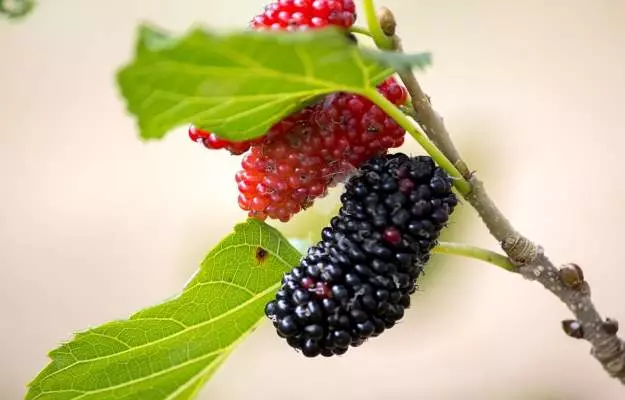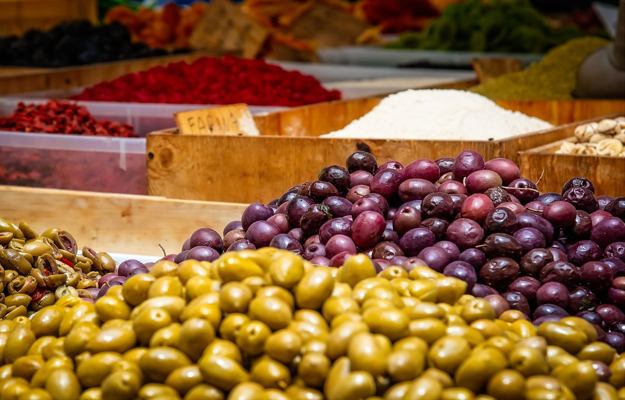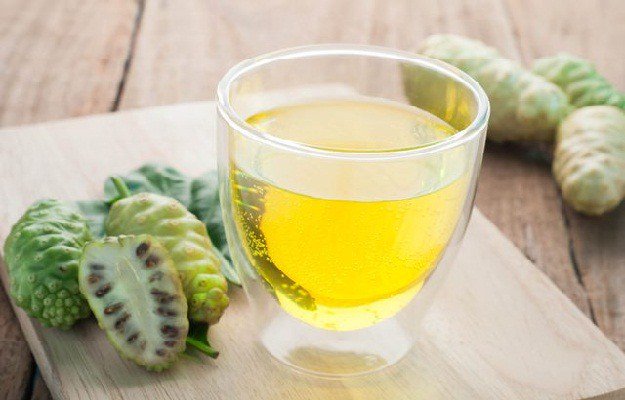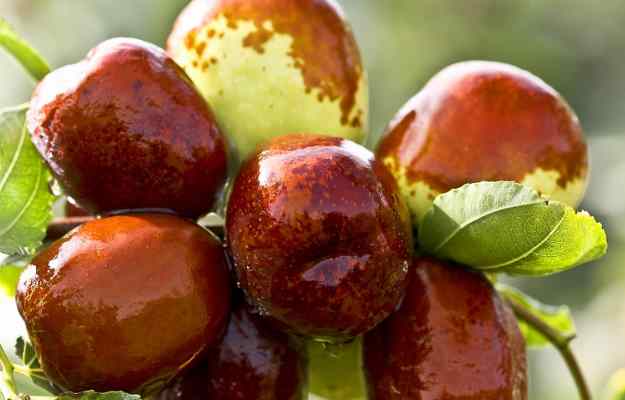Mulberry, commonly known as morus, belongs to the family Moraceae. The plant grows in the wild but is also cultivated extensively for its various benefits. Mulberries are generally found in three colours - white, red, and black. The use of mulberry is widespread in Europe, the Middle East, Africa and the Indian subcontinent. Mulberries are also widespread in Greece, particularly in the Peloponnese, known as ‘Morea’ in the Middle Ages, from which the word ‘Morus’ has been derived.
Traditionally in Greece, mulberries were dedicated to the goddess of wisdom, Minerva. In traditional Chinese herbal medicine, mulberries were used for centuries to treat heart diseases, diabetes, anaemia, and arthritis. It was also widely used in folk medicine, especially for the treatment of ringworm. In Ayurveda, mulberries have been used for the treatment of urine infection, intestinal worm infestations and skin infections.
Historically, mulberries are connected to the growth of the silk industry. In the Orient regions, mulberry leaves were used to fatten silkworms. The spread of mulberry trees across the world, thus, in a way, can be attributed to the need of mulberry leaves for the development of the silkworm industry.
Mulberries grow rapidly when young but they stop growing once they are about 10 to 15 metres. The mulberry bears multiple fruits, generally green or yellow when young turning red, black or white depending upon the species upon ripening and have a sweet flavour.
Some basic facts about mulberry (shahtoot)
- Botanical Name: Morus alba
- Family: Moraceae
- Common Name: Morus, mulberry
- Sanskrit Name: Shahtoot
- Parts Used: Fruits, leaves, barks
- Native Region and Geographical Distribution: Native to subtropical and temperate regions
- Nutritional value of mulberry
- Side effects of mulberry
- Other benefits of mulberry
-
Health benefits of mulberry
- Mulberry as anti-inflammatory
- Mulberry for cancer
- Mulberry for brain
- Shahtoot for oxidative stress
- Mulberry for skin and hair
- Mulberry for bone tissue
- Mulberry for liver
- Mulberry leaves for boosting immunity
- Shahtoot for the eyes
- Mulberry for improved blood circulation
- Mulberry for diabetes
- Shahtoot for the heart
- Mulberry for digestion
- Shahtoot for blood pressure
Nutritional value of mulberry
| Nutrients | Value per 100g (mg) |
| Energy | 43 |
| Water | 87.68 |
| Carbohydrate | 9.80 |
| Protein | 1.44 |
| Fats (Total lipids) | 0.39 |
| Fibres | 1.7 |
| Sugars | 8.1 |
| Vitamins | |
| Vitamin A | 1 |
| Vitamin B1 | 0.029 |
| Vitamin B2 | 0.101 |
| Vitamin B3 | 0.620 |
| Vitamin B6 | 0.050 |
| Vitamin B9 | 0.006 |
| Vitamin C | 36.4 |
| Vitamin E | 0.87 |
| Minerals | |
| Potassium | 194 |
| Calcium | 39 |
| Magnesium | 18 |
| Phosphorus | 38 |
| Sodium | 10 |
| Iron | 1.85 |
| Zinc | 0.12 |
| Fats | |
| Saturated | 0.027 |
| Monounsaturated | 0.041 |
| Polyunsaturated | 0.207 |
Side effects of mulberry
The possible side effects of mulberry have been discussed below.
- Morus alba can lower glucose levels, and so, if used in combination with diabetes medication, can increase the risk of hypoglycemia (low blood sugar).
- The potassium component of mulberries can cause complications in people with kidney disorders.
- Some people may experience an allergic reaction to mulberries. There have also been reports of reactions in those who are sensitive to birch pollen due to cross-reactivity. If you experience side effects of any kind, it is best to discontinue use and talk to your doctor.
- Morus alba can lead to a decrease in the absorption and blood concentration of cyclosporine, a drug used in transplant patients. Patients who had recently undergone liver or kidney transplants should refrain from consuming mulberries.
- Some people may experience hallucinations after consuming mulberries.
- There are no documented reports about the effect of mulberries on pregnant and breastfeeding women. It is, therefore, important to consult your doctor before consuming mulberries.
Other benefits of mulberry
- Besides health benefits, mulberry is widely cultivated for its contribution to the silk industry. Mulberry leaves, particularly those of the white mulberry variety, are ecologically important as they are the only food source of the silkworm. The worm had been named Bombyx mori, after the genus Morus. The wild silkworm also eats mulberry. The cocoon of this silkworm is used to make silk.
- The colour of the mulberry fruit is due to the presence of anthocyanins, which have an effect in preventing various diseases. Anthocyanins are responsible for the vivid colours of the fruit. These colours can be extracted easily and are soluble in water, yielding natural food colourants. Due to a growing demand for natural food colourants, the significance of mulberries in the food industry is increasing.
Health benefits of mulberry
Mulberries are known for their use in various traditional medicines due to the wide variety of nutrients present in them. The various health benefits of mulberry have been discussed below.
Mulberry as anti-inflammatory
Studies have found that mulberry leaves have anti-inflammatory properties, which reduce body’s inflammatory response to chronic diseases.
According to a recent study, mulberry leaf tea can be used to reduce inflammatory pain. The anthocyanins present in mulberries are attributable for its activity against inflammation.
Mulberry for cancer
The anti-cancer effect of Morus alba is due to compounds- morusin and kuwanon C and G. These prevent cell growth and increase cell death in cancer cells.
In a recent study, it was found that root bark extract of mulberry dose-dependently stopped cell growth and induced cell death in human colorectal cancer cells. It worked by activating ATF3 production, which plays an important role in programmed cell death also known as apoptosis.
The root bark extract also decreased cyclin D1 protein levels in cancer cells causing the cell cycle to stop.
However, further research is required to isolate the active components that are responsible for these effects.
Another study suggests that the anthocyanins present in mulberry can help in the prevention of several types of carcinomas.
Mulberry for brain
Studies have found that bioactive compounds present in mulberry fruit extracts had a cytoprotective effect on brain cells exposed to hydrogen peroxide in vitro and a neuroprotective effect on cerebral damage caused by oxygen-glucose deprivation (OGD) in vivo.
Therefore, it is suggested that mulberry fruits possess neuroprotective effects under oxidative stress conditions. So, it is important that mulberries be included in the diet to prevent age-related brain diseases such as dementia.
Shahtoot for oxidative stress
In a recent study, it was found that mulberry fruit extract has a protective activity against ethyl carbamate induced cytotoxicity in human liver and oxidative stress.
The juice prepared from mulberry leaves are also rich in anthocyanins which act as antioxidants to reduce exercise-induced oxidative stress and physical fatigue.
Mulberry for skin and hair
Mulberries also host high levels of Vitamin A and Vitamin E, along with a range of carotenoid components like lutein, beta-carotene, zeaxanthin, and alpha-carotene.
All these nutrients act as antioxidants that neutralise free radicals specifically affecting the skin, tissue and hair. Mulberries can aid in skin care by reducing the appearance of blemishes, age spots, and pigmentation. It can also aid in the strengthening of hair roots.
Mulberry for bone tissue
Mulberries are an abundant source of calcium, and iron, which is the best combination of nutrients to maintain and build strong bone tissues and bones.
These nutrients help the bones in stopping the process of bone degradation and prevent bone disorders such as osteoporosis, and arthritis.
Mulberry for liver
Mulberries also have a hepatoprotective (liver protecting) function.
A recent study reported that mulberry fruit extracts suppressed the synthesis and enhanced the oxidation of fatty acids.
Thus, mulberry fruits are likely to prevent non-alcoholic fatty liver disease.
Mulberries also are high in iron which is an important nutrient for maintaining liver health. So, make sure to include this much useful component in your diet.
Mulberry leaves for boosting immunity
Mulberry leaves play a role in improving the immune system by activating macrophages by means of the alkaloids present in them. Macrophages help in keeping the immune system alert.
Mulberries are rich in Vitamin C, a nutrient that strengthens immunity. Vitamin C acts as a powerful defensive weapon against any foreign pathogens in the body.
A single serving of mulberries contains almost a day's source of Vitamin C for the body.
Thus consuming either mulberries or leaves of mulberry juice help in activating the immune system and eliciting an immune response.
Shahtoot for the eyes
Consuming mulberries can be beneficial for eye health. One of the carotenoids found in mulberries is zeaxanthin. This bioactive compound in mulberries has a direct role in the reduction of oxidative stress on certain ocular cells, along with the retinal macula lutea.
Additionally, zeaxanthin functions as an antioxidant and prevents certain damage to the retina, including free radicals that are responsible for causing macular degeneration and cataracts.
Mulberry for improved blood circulation
Mulberries have been used as a remedy for improving blood health since ages. Ancient Chinese medicine made use of mulberries in blood tonics meant to cleanse the blood and increase its production.
The high levels of iron content in mulberries can also significantly boost the production of red blood cells. This causes the body to improve its distribution of oxygen to important tissues and organs, thereby aiding to boost metabolism and optimize the functioning of those systems.
Mulberry for diabetes
Diabetes is a condition characterised by hyperglycemia which results from the defects in secretion of insulin. It can lead to a series of health complications including cardiovascular disorders and failure of various organs. Mulberry fruits might play an important role in the treatment of diabetes because of their anti-hyperglycemic and anti-hyperlipidemic effects.
Studies found that including mulberry in the diet can help in lowering blood glucose levels. In addition, mulberry consumption also helps to improve insulin resistance as evidenced by studies.
The ability to lower blood glucose levels is attributed to the antioxidant components of mulberry such as superoxide dismutase, glutathione peroxidase and catalase that act to neutralize the activity of free radicals. A combination of the extract of mulberry leaf and fruits can also act to reduce diabetes-induced weight gain. This effect is due to the action of the antioxidants that act to modulate the oxidative stress in the body.
Shahtoot for the heart
Cardiovascular diseases are one of the leading cause of deaths worldwide with about 17 million deaths yearly. Hyperlipidemia is one of the major risk factors for cardiovascular diseases.
Studies have found that a diet supplemented with 5 to 10 per cent mulberry fruit powder showed a significant decrease in the concentration of serum and liver triglyceride, total cholesterol and serum LDL cholesterol. In addition, there was an increase in the high-density lipoprotein (HDL) cholesterol.
(Read more: High cholesterol symptoms)
It is suggested that the presence of dietary fibre in mulberry fruits inhibits the hepatic lipogenesis and increases the receptor activity of LDL.
Research suggests that mulberry fruits have a hypolipidemic effect owing to their high content of dietary fibre and linoleic acid. The fibre content of mulberries also helps regulate cholesterol levels and can improve heart health when regularly added to the diet.
Mulberry for digestion
Mulberries contain dietary fibre, which makes approximately 10% of the daily requirements in a single serving.
Dietary fibre can help to improve digestion by bulking up the stool, thus, speeding up the movement of food through the digestive tract, while also preventing constipation, bloating, and cramping.
Shahtoot for blood pressure
Mulberries can reduce blood pressure as they are very rich in the antioxidant resveratrol. Resveratrol is an important flavonoid that directly affects the functioning of certain mechanisms in blood vessels. This alteration of mechanism primarily makes blood vessel less prone to damage by angiotensin, responsible for causing blood vessel constriction.
Additionally, resveratrol increases the production of nitric oxide, which acts a vasodilator. It acts to relax blood vessels and reduces the chances of formation of a blood clot and related heart issues like stroke or heart attack.
Medicines / Products that contain Mulberry
- Cipzer Sharbat Toot Siyah 200 ml - ₹449
- Kojivit Ultra Cream - ₹683
- Kojivit Plus Gel 15gm - ₹369
- Kojivit Gel - ₹326
- Biluma Cream - ₹589
- Hawaiian Herbal Aller Well Capsule-Get 1 Same Drops Free - ₹469
- The Dave's Noni Natural And Organic 365 Immunity booster Juice 500ml - ₹849
- Shri Chyawan Ayurveda Noni Juice 500ml - ₹699
- Mamaearth Bye Bye Blemishes with Mulberry Extract & Vitamin C Face Cream - ₹449
- The Dave's Noni Natural And Organic 365 Immunity booster Juice 250ml - ₹449
- The Dave's Noni Natural And Organic 365 Immunity booster Juice 500ml Pack Of 3 - ₹2547
- Serum Expert's Intimate Lightening Serum For Intimate Areas, Neck, Knees, Underarms and other sensitive body areas 50ml - ₹499
- Urban Veda Purifying Ayurvedic Neem Facial Oil 30ml - ₹3499
- Ayouthveda Licorice & Mulberry Face Serum Sheet Mask - ₹150
- The Dave's Noni Natural And Organic 365 Immunity booster Juice 250ml Pack Of 2 - ₹898
- The Dave's Noni Natural And Organic 365 Immunity booster Juice 250ml Pack Of 3 - ₹1347
- The Dave's Noni Natural And Organic 365 Immunity booster Juice 500ml Pack Of 2 - ₹1698
- Charak Evenshade Cream - ₹100
- Hamdard Sharbat Toot Siah - ₹118
- Kojivit Plus Gel 30gm - ₹307
- Dave’s Noni Juice 1000ml - ₹1050
- Oshea Herbals Glopure Fairness Face Wash 120ml - ₹158
- Strictly Organics Collagen Boosting Night Serum - ₹539
- Vigini Natural Actives Skin Whitening Lightening Brightening Underarm Body Cream (200ml) - ₹359
- Vigini Natural Actives Skin Whitening Lightening Brightening Underarm Body Cream (100ml) - ₹329
- Shree Dhanwantri Beutanic Blueberry & Mulberry Gel - ₹247
- Himalayan Organics Bio Mulberry Cream 50gm - ₹599
- HealthyHey Nutrition Natural Mulberry Leaf Extract Capsule - ₹499
- Oshea Herbals Glopure Fairness Serum - ₹446
- Oshea Herbals Radiance D Tan Face Pack - ₹257
- Oshea Herbals Phytowash Luxury Facewash - ₹293
- Oshea Herbals Glopure Fairness Face Wash 80ml - ₹113
- Kojilic Gel - ₹175
- The Dave's Noni Luxury Wellness Drops 30ml - ₹499
- Charak Evanshed Ointment - ₹72
- The Dave's Noni Luxury Wellness Drops Pack Of 2 - ₹998
- The Dave's Noni Luxury Wellness Drops Pack Of 3 - ₹1497
- Dave’s Noni Juice 1000ml Pack of 3 - ₹3150
References
- Hongxia Zhang et al. Effects of Mulberry Fruit (Morus alba L.) Consumption on Health Outcomes: A Mini-Review . Antioxidants (Basel). 2018 May; 7(5): 69. PMID: 29883416
- Thanchanit Thaipitakwong, Surawej Numhom, Pornanong Aramwit. Mulberry leaves and their potential effects against cardiometabolic risks: a review of chemical compositions, biological properties and clinical efficacy. Pharm Biol. 2018; 56(1): 109–118. PMID: 29347857
- Ewelina Król et al. The Effects of Supplementary Mulberry Leaf (Morus alba) Extracts on the Trace Element Status (Fe, Zn and Cu) in Relation to Diabetes Management and Antioxidant Indices in Diabetic Rats . Biol Trace Elem Res. 2016; 174(1): 158–165. PMID: 27071614
- Yihai Wang et al. Antidiabetic and Antioxidant Effects and Phytochemicals of Mulberry Fruit (Morus alba L.) Polyphenol Enhanced Extract . PLoS One. 2013; 8(7): e71144. PMID: 23936259
- Qi Ge et al. Mulberry Leaf Regulates Differentially Expressed Genes in Diabetic Mice Liver Based on RNA-Seq Analysis . Front Physiol. 2018; 9: 1051. PMID: 30131712
- Hu Chen et al. Anti-Inflammatory and Antinociceptive Properties of Flavonoids from the Fruits of Black Mulberry (Morus nigra L.) . PLoS One. 2016; 11(4): e0153080. PMID: 27046026
- Shu Wang et al. An Efficient Preparation of Mulberroside A from the Branch Bark of Mulberry and Its Effect on the Inhibition of Tyrosinase Activity . PLoS One. 2014; 9(10): e109396. PMID: 25299075
- Muhammad Ali Khan et al. A comparative study on the antioxidant activity of methanolic extracts from different parts of Morus alba L. (Moraceae) . BMC Res Notes. 2013; 6: 24. PMID: 23331970
- Mark Lown et al. Mulberry-extract improves glucose tolerance and decreases insulin concentrations in normoglycaemic adults: Results of a randomised double-blind placebo-controlled study. PLoS One. 2017; 12(2): e0172239. PMID: 28225835

































